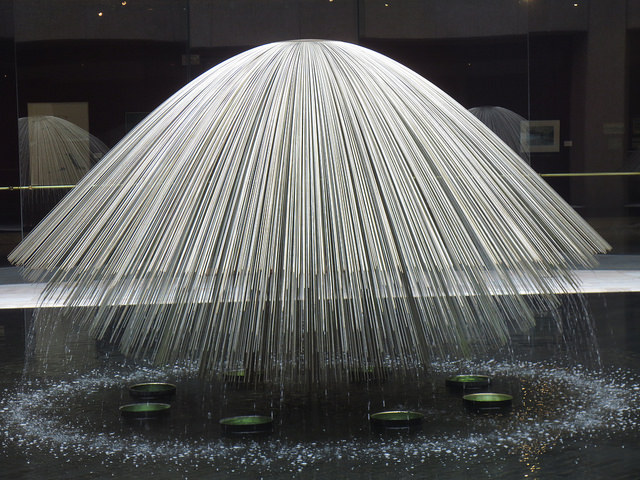‘Coupling’ – the relationships between different democratic institutions and practices – needs champions who can make elites think differently
A significant shortcoming in today’s deliberative systems is that citizens are largely disconnected from a host of elite sites of public deliberation. Here, Carolyn Hendricks explores the concept of ‘coupling’ as a means to better link citizens and elites in deliberative systems.

Credit: Mertle, CC BY 2.0
Modern politics is often characterised as a world of electoral sound bites and party competition, with few opportunities for informed public debate. But this is perhaps an unfair representation of what goes on at the heart of most contemporary democracies.
Out of the media spotlight there exists a routine underworld of policy deliberation that goes on in parliaments and their committees, courts, advisory bodies, commissions, party rooms, and numerous collaborative partnerships.
This is a deliberative, but highly elite world occupied by officials, leaders and experts. Citizens do, of course, find alternative spaces to contest and discuss policy issues, but the challenge for modern democracies is whether our elite deliberators are listening.
Disconnections between elites and citizens have plagued democracies throughout the centuries. Yet recent developments in the practice and theory of deliberative democracy provides an opportunity to rethink how we might better ‘couple’ spaces of elite deliberation with spaces of citizen deliberation.
Coupling
Coupling refers to the connections and relationships between different democratic institutions and practices so that they ‘speak to one another’.
As a metaphor, coupling draws our attention to the nature and strength of relationships and interdependencies between different formal and informal institutions in our democratic systems (for example, parliaments, parties, mass media, and online and offline forms of public debate) and to the spaces that develop in-between.
In practice, deliberative coupling takes on many forms ranging from self-generated linkages between actors or institutions through to more ‘designed’ approaches where disconnected spaces of policy debate are formally linked.
This kind of ‘designed coupling’ has been identified as especially important for fostering connections between citizens in participatory forums and elites in formal decision-making sites.
An institutional example of citizen-elite coupling involves integrating citizens’ forums, or mini-publics, into parliamentary committees.
Mini Publics
Mini-publics are innovative participatory forums (such as citizens’ juries) that bring together a group of randomly-selected citizens to deliberate on a particular policy issue. Mini-publics have captured the attention of many governments and community groups around the world because they provide a means to engage ‘hard to reach’ publics in complex and divisive issues.
Despite growing interest and experimentation with mini-publics (particularly in Australia), studies show that in practice most are democratically weak. Typically they are disconnected from relevant decision makers and governance activities, particularly those involving elites.
Parliamentary committees offer an obvious yet surprisingly understudied venue where mini-publics could gain more political attention and commitment. Committees not only represent an important venue of elite deliberation, but they play a vital role in seeking and representing public views on controversial issues.
In most parliamentary committees this opportunity for public input amounts to a narrow process of ‘evidence-taking’ by experts and affected groups. However, some parliaments in Australia and abroad are taking a more participatory approach to committee work by holding community forums and stakeholder roundtables.
This is part of a global trend towards making legislatures more connected, relevant, open, and ultimately more accountable to the public.
One innovative approach to coupling citizen and elite deliberations was undertaken by the New South Wales Parliament’s Public Accounts Committee (PAC). In 2012 the PAC under took an Energy Inquiry in which it actively sought out broader public views on energy issues.
It commissioned the newDemocracy foundation to design and convene a mini-public process involving two concurrent citizens’ juries: one run in an urban centre (Sydney); and the other in a rural centre (Tamworth). In total, 54 randomly selected citizens participated, with both juries meeting four-five times over a ten-week period.
The citizens’ juries were asked to consider the financial and public perception aspects of alternative forms of energy generation. After several months of deliberation the juries each produced a report, both of which were considered by the Committee in the preparation of its own report to Parliament which was tabled in Parliament in late 2012.
The mini-public was not only procedurally connected to the Committee’s Inquiry, but it engaged and had the support of all committee members. This was largely due to the strong commitment of the committee Chair; he not only instigated the process, but he ensured that the other committee members were well-informed of the mini-public procedure and encouraged them to attend the juries and interact with the citizens.
This real world case demonstrates the potential to bring together citizens and elites deliberating on complex policy issues.
In contrast to standard ‘evidence taking’ procedures of parliamentary committees, mini-publics offer decision-makers a broader social perspective; they capture perspectives from diverse social groups who together collectively shape representations of the public interest.
In doing so, mini-publics can enhance the representativeness of parliamentary debate by bringing perspectives from a cross-section of diverse citizens whose views, values and interests can be relatively unorganised, and thus not well captured or reflected in conventional advocacy work.
My qualitative research on this experience finds that, on the whole, elected officials welcome more structured ways to inject the voices of weaker and unorganised publics into their own elite deliberative bodies.
However, what this research uncovers is that there is much more to successful coupling than simply linking one deliberative site to another.
To be effective ‘designed coupling’ requires actors to step outside their comfort zone to build new relationships and engage in new spaces with different sets of ideas, actors and rules. This can be facilitated by institutional design, but it also needs leaders and champions of democratic renewal who are well-placed to encourage elites to think differently.
—
This piece is a synopsis of an article in the European Journal of Political Research. It originally appeared on the Democracy Renewal website, and is reposted with permission. It represents the views of the author and not those of Democratic Audit or the LSE. Please read our comments policy before posting.
—
 Carolyn Hendriks is Associate Professor of Public Policy and Governance at the Australian National University
Carolyn Hendriks is Associate Professor of Public Policy and Governance at the Australian National University





 Democratic Audit's core funding is provided by the Joseph Rowntree Charitable Trust. Additional funding is provided by the London School of Economics.
Democratic Audit's core funding is provided by the Joseph Rowntree Charitable Trust. Additional funding is provided by the London School of Economics.
Carolyn Hendricks on the concept of ‘coupling’ as a means to better link citizens & elites in deliberative systems https://t.co/g0y9BZOPTC
The notion of ‘coupling’ needs champions who can make elite think differently https://t.co/tfFcA59qZ5
‘Coupling’ – the relationships between different democratic institutions and practices https://t.co/Vm4m6MUAz8
Carolyn Hendricks on the concept of ‘coupling’ as a means to better link citizens & elites in deliberative systems https://t.co/PLGpNS52Vg
‘Coupling’ – the relationships between different democratic institutions and practices –… https://t.co/nGMFqunKu9 https://t.co/kVaT0FhTIs